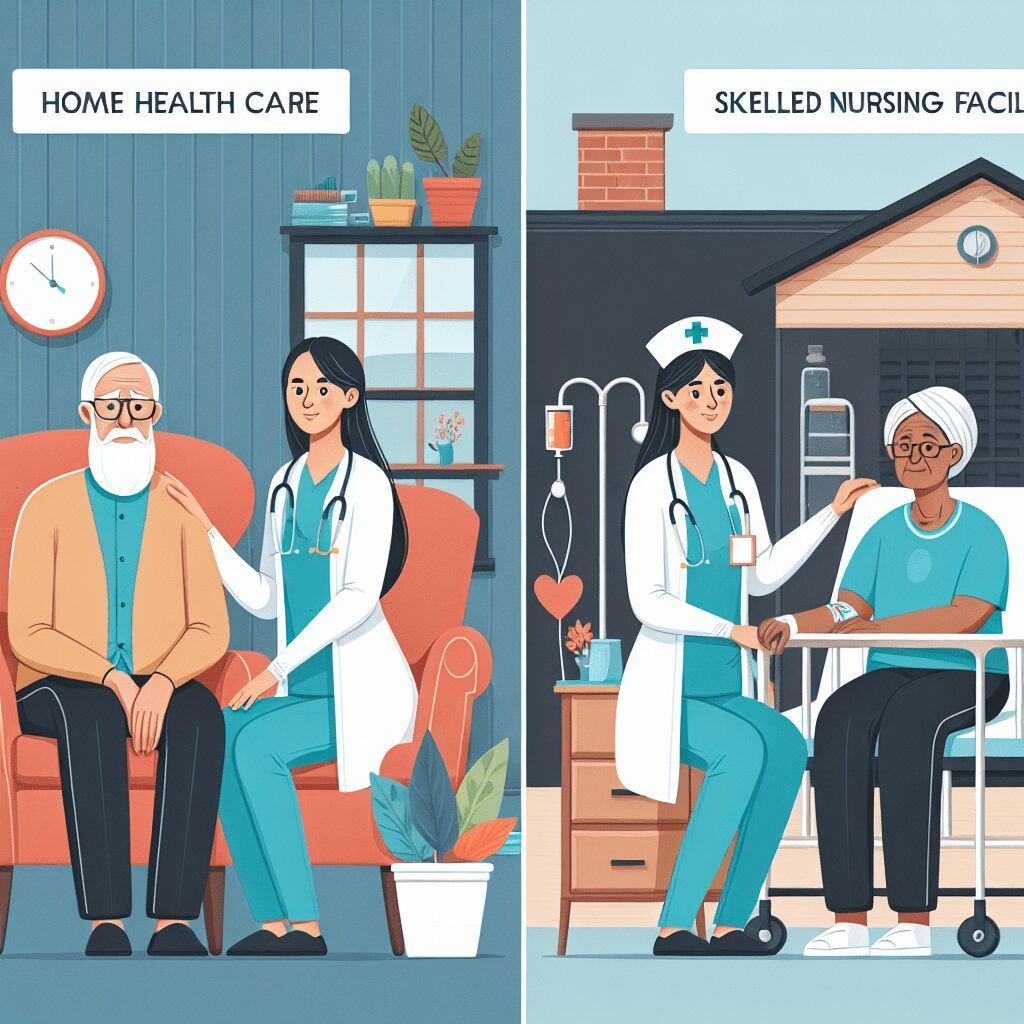Nursing Homes: Caring for Seniors with Compassion
As we get older, many people need extra help with daily tasks or specialized healthcare. Nursing homes, or skilled nursing facilities, help seniors by providing specialized care. They offer various services like skilled nursing, medical care, rehabilitation, and long-term care. Nursing homes support seniors with compassion and professionalism in a comfortable environment.
Definition of Nursing Homes
A nursing home is a type of long-term care facility that provides a higher level of medical care, supervision, and assistance with daily activities compared to other residential options. These facilities primarily focus on custodial care, nursing care, and rehabilitation services, serving individuals who require around-the-clock support with their healthcare and daily tasks.
Nursing homes stand out from other places, such as assisted living facilities, because they offer more intensive medical services. Patients receive skilled nursing care from licensed nurses and medical professionals who provide necessary treatments. Nursing homes create personalized care plans, including medication management, chronic condition support, and assistance with activities such as eating and dressing. Federal regulations oversee nursing homes to ensure quality care and services for residents.
Key Takeaways on Nursing Homes
When evaluating nursing homes, it’s important to consider the following key points:
-
Understanding the difference between skilled nursing facilities and nursing homes is crucial.
-
Be aware of the services offered and coverage options like Medicare, Medicaid, and long-term care insurance.
-
Consider the level of care needed, services available, and financial implications when choosing a facility.
-
Assisted living facilities, board and care homes, and continuing care retirement communities offer varying levels of care.
-
Health assessments, federal regulations, and recreational activities are essential to evaluate.
-
Residents in nursing homes receive 24/7 assistance with daily activities and medical care.
-
Adherence to federal regulations, access to rehabilitation, and skilled nursing care are vital aspects.
-
Payment options, including Medicare coverage, should be considered to cover the costs of stay.
Care and Compassion in Nursing Homes
Importance of Compassionate Care
Compassionate care is essential in nursing homes, as it helps residents feel better by giving them personalized attention and support. This type of care addresses emotional and mental health needs, not just medical ones, which is crucial for individuals in long-term care. Nursing homes and assisted living places prioritizing compassionate care create a loving environment where residents feel respected and well taken care of. Compassionate care enhances services and fosters a sense of community among residents.
Nursing homes use compassionate care to offer holistic healthcare, considering all the different needs of people in long-term care. In these settings, compassionate care is key to providing respectful care that improves residents’ well-being.
How Nursing Homes Provide Care
Nursing home facilities provide comprehensive care services, including skilled nursing, rehabilitation, and long-term care. They offer round-the-clock assistance with healthcare and daily activities. Residents receive nursing care, personal care help, and access to services like physical therapy. Trained medical professionals such as registered nurses, licensed practical nurses, and nurse aides ensure personalized care, working under doctors’ supervision for residents’ medical needs.
Besides medical services, nursing homes may have recreational activities and social programs that promote residents’ overall well-being. Adherence to federal regulations and state guidelines ensures quality care. Medicare covers post-hospital care, providing up to 100 days in a skilled nursing facility per benefit period after a qualifying hospital stay. For residents needing financial assistance, Medicaid and long-term care insurance may cover nursing home expenses.
Quality of Care in Nursing Homes
Skilled Nursing Facility vs. Nursing Home
Skilled Nursing Facilities (SNFs) and Nursing Homes differ in their care level. SNFs offer skilled nursing care by registered nurses under doctor supervision, focusing on medical treatment and rehabilitation. Nursing homes, on the other hand, provide custodial care through licensed practical nurses and nurse aides. SNFs prioritize transitional care, aiming for patients to recover enough to go home, while Nursing Homes focus on long-term residential care for individuals unable to care for themselves due to various reasons, such as medical, cognitive, or functional issues.
Both SNFs and Nursing Homes ensure quality care by following federal regulations, providing round-the-clock assistance, conducting health assessments, and offering services such as physical therapy, occupational therapy, and speech therapy. Medicare generally covers up to 100 days in an SNF after a hospital stay but does not cover long-term custodial care in a Nursing Home. Medicaid or long-term care insurance may cover some costs for Nursing Home care. Residents in both types of facilities receive quality healthcare services and assistance in daily living activities.
Resources for Nursing Home Residents
Nursing home residents have access to different levels of care within the facility, including skilled nursing, personal care, and assistance with daily activities. Other services available include recreational activities and medical treatment to improve residents’ quality of life. Nursing homes must provide a written description of residents’ legal rights, with this information available from the state Medicaid agency.
Residents can also benefit from staff, social workers, and mental health professionals who address their physical, emotional, and social needs. Funding options like long-term care insurance, Medicare, and Medicaid can help cover care costs. Residents should explore these resources to ensure they receive personalized care and support for their well-being.
Special Considerations in Nursing Homes
Privacy in Nursing Homes
Nursing homes prioritize resident privacy by implementing strict policies to safeguard personal and medical information. These facilities adhere to federal and state guidelines to protect confidentiality and dignity. Medicare covers post-hospital care in skilled nursing facilities for up to 100 days per benefit period. Long-term custodial care is not covered by Medicare. Still, Medicaid can help cover nursing home costs based on income, and long-term care insurance is another option for financial assistance.
Nursing homes offer residents a safe and comfortable environment, with services like personal care, supervision, and recreational activities. Residents receive custodial care, with nursing staff overseeing daily living activities. Special care is provided to individuals with medical or functional limitations to ensure compassionate assistance.
Paying for Nursing Home Care
Paying for nursing home care involves various options, such as Medicare covering up to 100 days in a skilled nursing facility after a hospital stay. Medicaid is another source of help for eligible individuals to cover costs. Long-term care insurance is also an option to consider for nursing home care expenses. Some may choose private payment if other options are unavailable to ensure access to necessary care.
Understanding coverage options, such as Medicare and Medicaid, is essential for planning nursing home care financially. Awareness of Medicaid program requirements and state regulations for nursing facility services is vital. Exploring long-term care insurance policies coverage for nursing home care can offer additional financial assistance. By reviewing these options and understanding care service costs, individuals can make well-informed decisions when planning for nursing home care.
Choosing a Nursing Home Facility
Questions to Ask When Choosing a Nursing Home
When choosing a nursing home, consider the following questions:
-
What is the staff-to-resident ratio?
-
How does the facility handle emergencies and provide ongoing medical services?
-
Are there special programs for residents with specific needs, such as rehabilitation services?
-
How does the facility maintain or improve residents’ physical, mental, and social well-being?
-
Does the nursing home follow federal regulations and state standards for Medicaid Nursing Facility certification?
-
What are the payment options, including Medicare and Medicaid coverage?
Partnerships in Nursing Homes
Partnerships in nursing homes can greatly benefit residents by expanding the services available. Collaborations with assisted living facilities help residents transition to more intensive care seamlessly. Working with home care services enables the creation of a customized care plan for residents. Partnerships with medical treatment centers enhance skilled nursing care, especially after hospital stays. These collaborations ensure residents receive continuous assistance, rehabilitation, and medical services.
Effective partnerships also help nursing homes follow federal regulations and maintain high care standards. For instance, partnerships with continuing care retirement communities offer a range of services to residents throughout different life stages. Strategic partnerships help nursing homes improve care quality, enhancing residents’ well-being and quality of life.
Data Process in Nursing Homes
How Nursing Homes Handle and Process Data
Nursing home security measures protect data, ensuring the privacy and confidentiality of residents’ information. Data is collected through various methods, such as electronic health records and documentation during health assessments. It is then securely stored in databases or cloud-based systems with restricted access to authorized personnel only.
Data processing and sharing within nursing home facilities adhere to state regulations and Medicaid program guidelines to maintain compliance. Costs related to care services, including data processing and management, are monitored to ensure they align with the coverage provided by long-term care insurance, Medicare, or Medicaid.
In-Home Skilled Nursing
Advantages of In-Home Skilled Nursing
In-home skilled nursing offers significant benefits compared to traditional nursing home care. One primary advantage is the comfort and familiarity of the home environment. Patients often experience less stress and anxiety when they can receive care surrounded by their personal belongings and loved ones. This comfort can greatly enhance their overall well-being and recovery process. In-home skilled nursing also provides personalized, one-on-one care, ensuring that each patient’s specific medical needs and personal preferences are fully addressed.
Flexibility and Convenience of In-Home Care
Another significant advantage of in-home skilled nursing is its flexibility and convenience. Patients do not need to adapt to the schedules and rules of a healthcare facility; instead, the care provided fits seamlessly into their existing routines. This can be particularly beneficial for those with chronic conditions or mobility issues, as it eliminates the need for transportation and the stress associated with moving to a new environment. Additionally, having family members nearby allows for continuous emotional support and involvement in the care process, significantly contributing to the patient’s recovery and happiness.
Personalized Care and Support
In-home skilled nursing ensures that patients receive care in a more intimate and personal setting. This can lead to higher patient satisfaction and potentially better health outcomes, as care is more aligned with the patient’s lifestyle and personal preferences. Furthermore, the presence of family members and the ability to maintain a semblance of normal daily life can be immensely beneficial for the patient’s emotional and psychological well-being. While both in-home skilled nursing and
Healthcare facilities have unique advantages, but the choice ultimately depends on the patient’s specific medical needs, personal preferences, and lifestyle considerations.
FAQ
What services do nursing homes provide for seniors?
Nursing homes provide services such as assistance with activities of daily living, medical care, social activities, and meals for seniors. Examples include help with bathing, medication management, physical therapy, and recreational programs.
How can I choose the right nursing home for my loved one?
Look for nursing homes with good ratings and reviews, visit and tour facilities, speak with staff and residents, inquire about staffing levels and services offered, and ensure the facility meets your loved one’s specific needs.
What is the importance of compassion in nursing home care for seniors?
Compassion in nursing home care for seniors is crucial as it enhances emotional support, improves overall well-being, and creates a more positive environment for residents. Simple acts of kindness, listening attentively, and showing empathy can significantly impact the quality of care received.
What are some common challenges faced by seniors in nursing homes?
Common challenges faced by seniors in nursing homes include loneliness, lack of independence, limited mobility, and health issues. Examples include feeling isolated due to limited social interactions, struggling with the loss of freedom, difficulty moving around independently and managing chronic health conditions.
How can family members support their loved ones in nursing homes?
Family members can support their loved ones in nursing homes by visiting regularly, engaging in activities together, helping with personal care needs, advocating for their rights, and staying in touch through phone calls or video chats.
ABET Life Home Health & Caregiving specializes in providing compassionate in-home nursing care tailored to meet the needs of seniors. Our experienced professionals offer a range of medical care services, all within the familiar comfort of your loved one’s home. We focus on enhancing quality of life through personalized care plans that address both physical and emotional well-being. Contact us today to learn how our dedicated care can support the seniors in your family.
The post Nursing Homes: Caring for Seniors with Compassion first appeared on Home Health & Care Giving Service in Houston, TX.

Whether dealing with chronic illness or needing help recovering a surgery, ABET Life will support you with our focused care — covered by Medicare or other insurance carriers for qualified patients.
USEFUL LINKS
All Rights Reserved | AbetLife, Inc | Terms of Use | Privacy Policy











